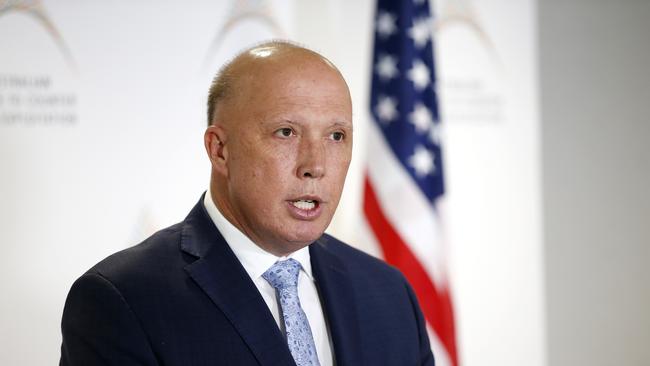‘Unacceptable risk’: Terrorist Abdul Nacer Benbrika will stay jailed despite finishing sentence
A convicted terrorist who plotted terrifying attacks on major Aussie targets will not be let out of jail despite finishing his sentence.

A convicted terrorist will stay behind bars despite finishing his sentence after a judge agreed he was an “unacceptable risk” to the community.
Victorian Supreme Court Justice Andrew Tinney ruled on Christmas Eve that Abdul Nacer Benbrika will spend a further three years in prison, granting an application by the Department of Home Affairs.
Benbrika was arrested in 2005 and later convicted of being the leader of a Melbourne terrorist cell plotting attacks on major targets in Australia’s biggest cities.
The 60-year-old was due to be released in November after spending 15 years behind bars, but the Department of Home Affairs applied to the court to keep him locked up for another three.
It persuaded the court the “self-proclaimed Sheikh” was likely to participate in terror-related activities or influence others with extremist views if freed.
BENBRIKA’S LOVE OF ‘VIOLENT JIHAD’
The MCG, Crown Casino and a nuclear reactor near Sydney were among the targets mentioned by Benbrika’s group, a court previously heard.
A group member discussed with Benbrika the idea of assassinating former Prime Minister John Howard, his 2008 trial heard.
But he was not sentenced on the basis of plotting to attack any specific target.
The group wanted to use terrorist acts in an attempt to coerce the Australian government to withdraw troops from Iraq, Justice Tinney said.
He said Benbrika’s extremist views caused him to be “excluded” from the general Australian Muslim community.
They “brought him into conflict with other Muslims,” he said.
But the small number who shared his adherence to “violent jihad” looked up to him.
His followers discussed the 9/11 terrorist attacks in the US and the 2004 Madrid train bombings with “praise and admiration”, Justice Tinney said.
Benbrika was also a fan of Osama Bin Laden, Justice Tinney said.

JAIL VISITS FROM ISIS FIGHTERS
Benbrika enjoyed a “steady stream of problematic individuals” visiting him in prison, which Justice Tinney said was “not surprising”.
He had been visited in jail by at least two ISIS fighters, Department of Home Affairs lawyers told the court.
“It does seem there a lot of people who visited Mr Benrika in prison and then departed and never returned,” Justice Tinney said in an earlier hearing.
The Algerian-born man could be deported to Africa if released.
But even if he does leave Australia, lawyers for the Department of Home Affairs argued he would be able to incite terror from overseas using modern technology.
“There are known cases where terrorist offending has been instigated overseas and carried out in Australia by the use of the internet, telephone calls,” Justice Tinney said in an earlier hearing.
In an affidavit to the court, a police expert said the AFP believed Benbrika could also serve as a mentor to “vulnerable” individuals who had the potential to become Islamic extremists in Australia.

“I am concerned that Mr Benbrika will seek to establish … himself as a person who can give religious or ideological guidance to others and use this as a means of recruiting people to participate in terrorist acts,” he said.
Benbrika’s lawyer Brian Walter QC argued his client would be under a “comprehensive” interim control order if released which would be a less restrictive way to ensure he was monitored.
He said there was no proof his visitors in jail had discussed anything related to terrorism, and called an expert witness who argued there were not reliable methods of predicting a terrorist’s likelihood of reoffending.
CHANGE OF HEART A ‘FABRICATION’
Justice Tinney on Thursday found Benbrika’s claim of renouncing his violent beliefs to be implausible.
“I am satisfied the claimed change of heart by the defendant is a fabrication by him,” he said.
He said the terror leader was driven by the “extreme and powerful nature of the beliefs” he held.
Benbrika moved to Australia at the age of 29, and it was here that his interpretation of Islam “intensified” and grew more extreme.
He had “a lot of time on his hands” while unemployed and used it to “zealously and single-mindedly” study extreme and violent interpretations of Islam.
Justice Tinney said Benbrika’s personality structure was marked by a grandiose and narcissistic sense of self, with an inflated sense of importance and an excessive need for admiration.
He feels superior to others and has “rigidity” of thought, meaning he can not be influenced by others, psychologists told the court.
Benbrika told a psychologist he’s “pretty good at getting people to do what he wants”.
He had told prison authorities he read a particular text in 2014 that inspired him to “put aside his desire to pursue violence in the name of Allah”.
But Justice Tinney said this had a “whiff of implausibility” and was convenient timing.
He said the confession of reform came around the time Benbrika was trying to get parole — which was denied.
“I am satisfied the defendant has not changed his previous beliefs,” he said.
